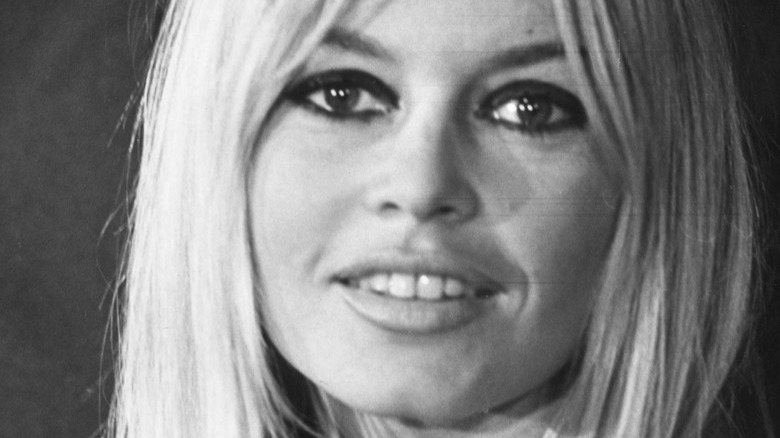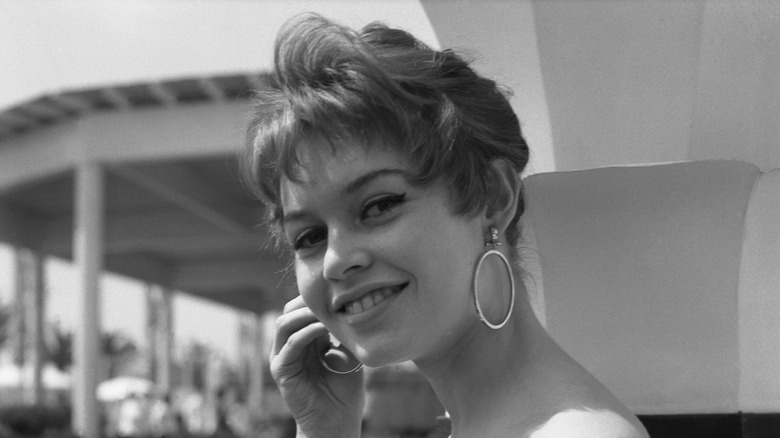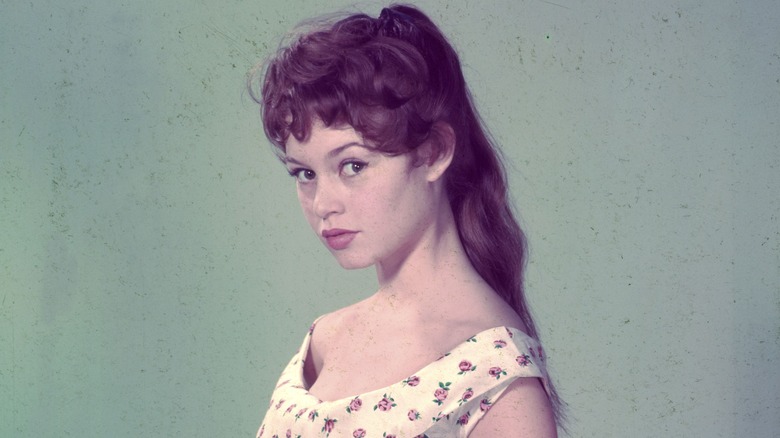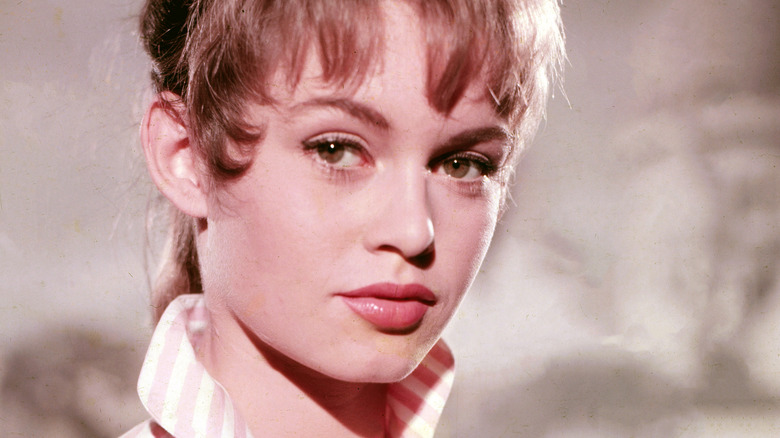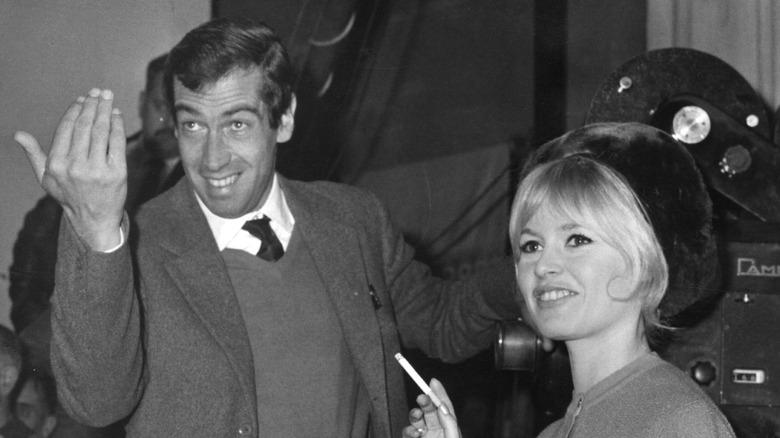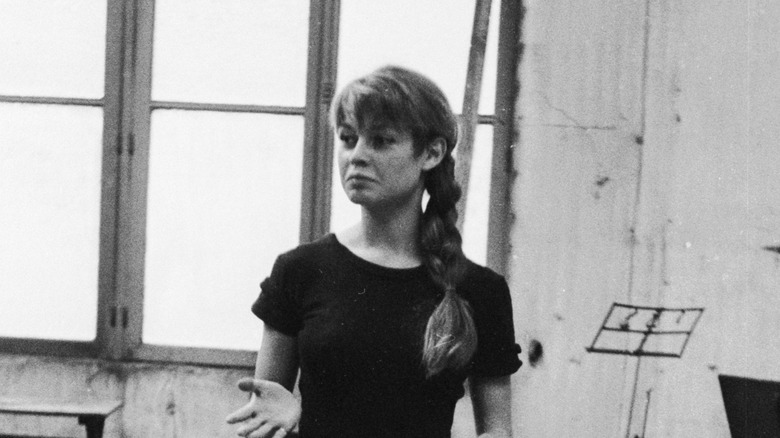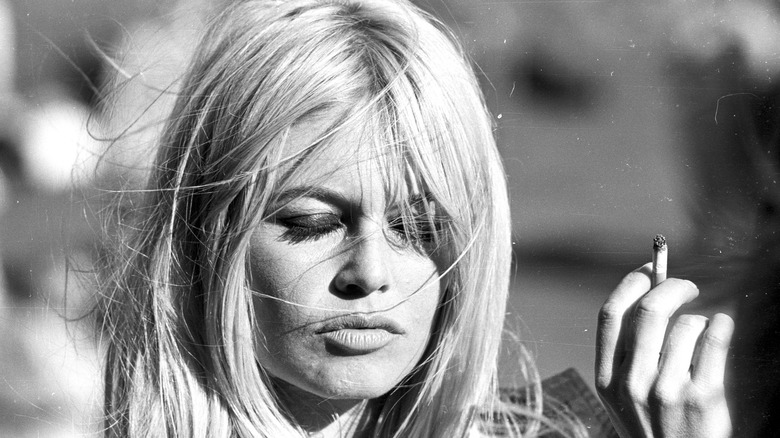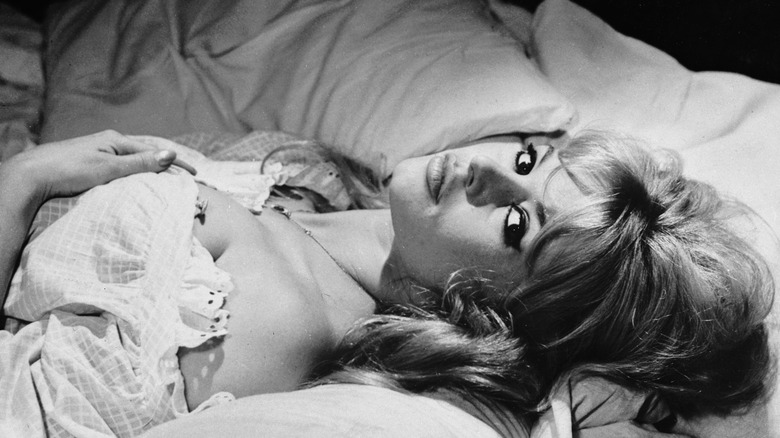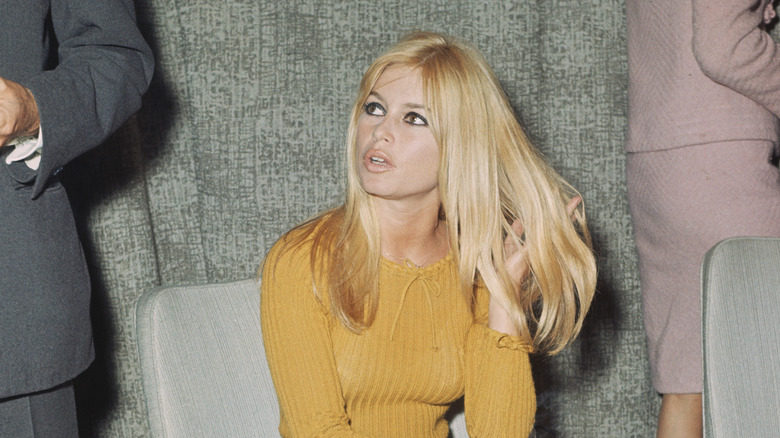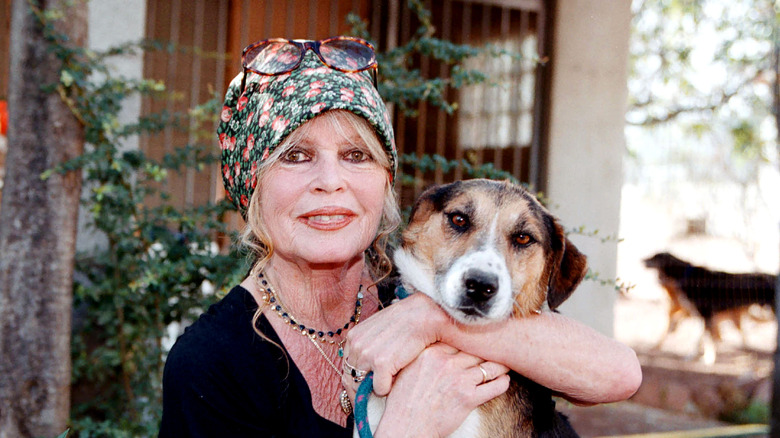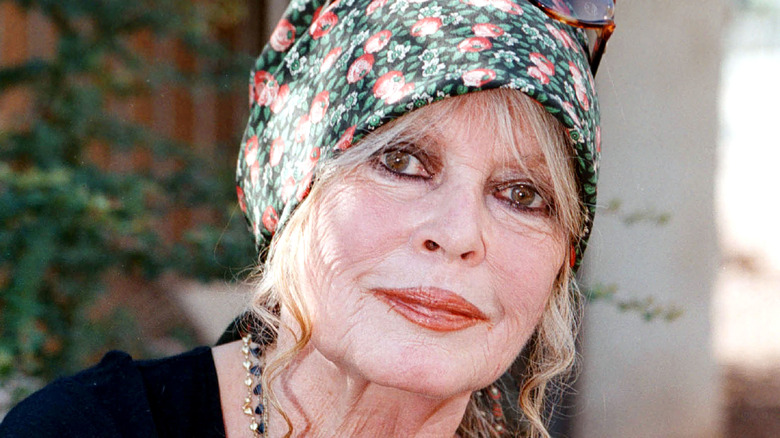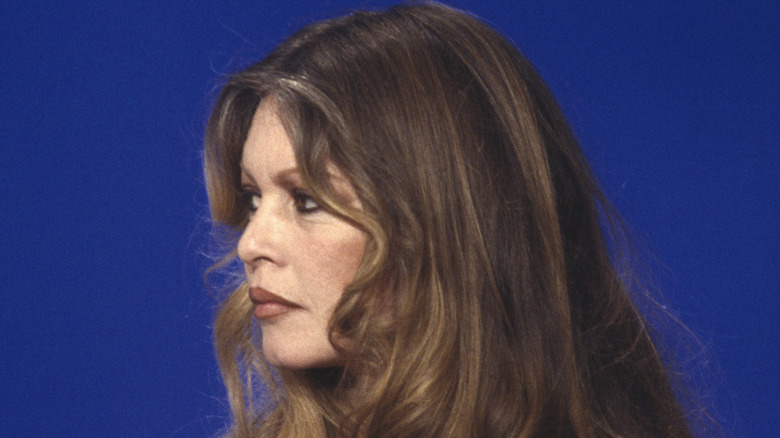Brigitte Bardot's Troubling Real-Life Story
Brigitte Bardot has been mythologized by the masses since her breakthrough role in her ex-husband Roger Vadim's 1956 film "And God Created Woman." Through her collaborations with iconic singer Serge Gainsbourg and iconic director Jean-Luc Godard, the French singer-actor became synonymous with iconic French beauty, hedonism, and sexual liberation. Whether she was dancing on tables, singing about pleasure, or simply sitting around in tights and a striped top, Bardot was the subject of much admiration and intrigue.
But Bardot's surface-level identity was one she neither embraced nor accepted — hence why she turned her back on the glamorous world of movies later in life. While so many people wanted to be her, or at least to be close to her, Bardot felt crushed under the weight of her acting career and the sense of emptiness that came with it. Sick of being seen — even in a flattering light — the actor-turned-activist worked instead to be heard, for better or worse.
Bardot's behind-the-scenes reality is far removed from the woman who danced, laughed, and enticed the male gaze on the movie screens. Starting in childhood and continuing for nearly nine decades, Bardot's life has been marked by bitterness, despair, and cruelty. Of course, Bardot is not a faultless victim; she has found herself in numerous courtrooms for hurtful and prejudiced remarks throughout her life, as noted by the Daily News. Still, here is a glimpse at the tragedy and pain that has marred the life of the former screen siren.
Brigitte Bardot has vision loss
What do Brigitte Bardot, Marilyn Monroe, and Kate Moss have in common? Aside from being iconic blonde beauties, the three women have unusual eye conditions. Monroe and Moss reportedly experienced strabismus, or crossed eyes, as noted by Harper's Bazaar. Bardot both have amblyopia, or "lazy eyes," as noted by the Independent and IMDB, respectively.
According to Mayo Clinic, the "lazy eye" phenomenon involved with amblyopia is caused by reduced vision in one eye, which wanders inward or outward. Signs and symptoms include poor depth perception and squinting. Amblyopia is the leading cause of decreased vision in childhood. According to IMDB, Bardot's left eye was the weaker, "lazier" eye, and the condition caused permanent vision loss in that eye.
Still, Bardot's amblyopia did not seem to decrease the power her eyes held for audiences. Her "cat eye" makeup became her signature look and has been recreated and emulated by the masses, as noted by outlets including Vogue and The Wall Street Journal.
She had strict parents
Brigitte Bardot grew up in a seven-bedroom apartment in an affluent corner of Paris, but her childhood wasn't entirely rosy. According to Barnett Singer's 2013 biography "Brigitte Bardot: A Biography," her parents, Louis Bardot and Anne-Marie Mucel, ran a strict, Catholic, conservative household. They reportedly dictated what Brigitte and her sister, Mijanou, wore each day and demanded the two girls maintain proper etiquette. Mucel exercised control over who her daughters played with, which left Brigitte feeling inferior at best, and isolated and lonely at worst. Louis and Mucel even killed Brigitte's beloved rabbit, Noiraud, and served him for dinner — which likely played a role in her later decision to become an animal rights activist (more on that later).
As Brigitte told Singer, she and Mijanou once accidentally broke a vase in their family apartment. Their father whipped them 20 times each as punishment. But what stung even more, according to Brigitte, was that he took the punishment beyond the physical and into the psychological by ignoring his two daughters. He and Mucel began addressing the two girls with the French pronoun "vous," which is used to address strangers and formal acquaintances.
Although such incidents had a profound impact on Brigitte, she has since been able to find some merit in their parenting style. "My parents gave me a strict upbringing," she once said (via Biography), "which at times has caused me to suffer distress but today I am grateful to them for it."
She attempted suicide
Brigitte Bardot has attempted to commit suicide at least four times over the course of several decades, as reported by the Sydney Morning Herald. The first time was when she was 16 years old and wanted to marry a 22-year-old director's assistant named Roger Vadim. When her parents found out about the affair, they threatened to send Bardot to England to keep her away from the older man, and vice versa. Bardot responded by sticking her head in a gas oven. Thankfully, her parents discovered her in time. But on September 28, 1960 — her 26th birthday — Bardot attempted suicide again by taking a bottle-load of sleeping pills and slitting her wrists.
At age 58, Bardot took an overdose of tranquilizers and had her stomach pumped, as reported by The Guardian. "Brigitte was overcome with fatigue and took too much medication to go to sleep," her husband, Bernard d'Ormale, said at the time (via People).
"When you live such intense moments as I have done there is always a bill to pay," Bardot told The Guardian. "You cannot escape the distress which follows great happiness." Despite her continued attempts to end her life, Bardot has now lived for nearly nine decades and has found a certain degree of peace. "I'm happier in my routine life today than when I was chased after by 100 photographers," she told The Guardian. "You mustn't think I am dissatisfied. That would be a form of bitterness. My life is now what I always wanted — what I dreamed about subconsciously."
If you or anyone you know is having suicidal thoughts, please call the National Suicide Prevention Lifeline at 1-800-273-TALK (8255).
She experienced abusive relationships
Brigitte Bardot married Roger Vadim, who was six years her senior, when she turned 18 years old, per the Sydney Morning Herald. The pair met when Bardot was just 16 years old. He made his directorial debut four years later with Bardot in a starring role in the 1956 film "And God Created Woman." Bardot's role in the movie turned her into a "sex symbol" overnight and ultimately created the hypersexualized image that followed her entire film career. Bardot then divorced Vadim and embarked on an affair with her married "And God Created Woman" co-star, Jean-Louis Trintignant.
As Bardot wrote in her 1996 autobiography, "Initials B.B." (via the Sydney Morning Herald), she had four husbands and more than 100 lovers. "I had a visceral need to be loved, to be desired, to belong body and soul to the man I admire, whom I love, whom I respect,″ Bardot wrote in "Initials B.B." (via AP News), while discussing her affairs with men including French crooner Serge Gainsbourg and American actor Warren Beatty. She also wrote about being physically abused by actor Jacques Charrier, who fathered her only son. She has been married to Bernard d'Ormale since 1992, as noted by People.
If you or someone you know is dealing with domestic abuse, you can call the National Domestic Violence Hotline at 1−800−799−7233. You can also find more information, resources, and support at their website.
Brigitte Bardot reportedly had a 'nervous breakdown'
In 1956, at the wild beginning of her career, Bardot was asked what she missed most about her life before the fame and fortune, to which she replied (via People), "a life without drama."
On February 8, 1958, French and Italian newspapers reported that Bardot had intentionally overdosed on sleeping pills two days prior in a suicide attempt, as reported by the Los Angeles Times at the time. Bardot's public relations manager denied these claims, stating that Bardot had a mere case of food poisoning. In any case, the Los Angeles Times reported that the French actor was recovering from a nervous breakdown at Cortina d'Ampezzo, a winter sports arena in northern Italy. Her sister, Marie, and her "French newsman friend," Paul Chaland, were reportedly in tow and staying at Hotel Miramonti, in the mountains above Merano in Italy.
The so-called breakdown came after Bardot split from her partner, Jean-Louis Trintignant, with whom she had been living for two years prior. According to "Brigitte Bardot," by Barnett Singer, the pair split because Trintignant was frequently away on military service and she'd had an affair with French musician Gilbert Bécaud.
If you or someone you know is struggling with mental health, please contact the Crisis Text Line by texting HOME to 741741, call the National Alliance on Mental Illness helpline at 1-800-950-NAMI (6264), or visit the National Institute of Mental Health website.
Her troubled relationship with her son
Brigitte Bardot had her only child, a son named Nicolas, with her second husband Jacques Charrier. Detailing her 1959 pregnancy in her memoir "Initials B.B.," Bardot wrote (via the the Independent), "I looked at my flat, slender belly in the mirror like a dear friend upon whom I was about to close a coffin lid." She went on to reveal that she had punched herself in the stomach repeatedly and asked her doctor for morphine in an attempt to terminate the pregnancy. To top it all off, she referred to her then-unborn child as a "cancerous tumor" and added that she would have "preferred to give birth to a little dog." Following the release of the memoir, Nicolas and the elder Charrier sued Bardot for the remarks. A French court ordered her to pay £28,000 — approximately $38,000 — in damages and that certain passages of the book should be prefaced with warning labels.
Charrier reportedly denied Bardot access to their son once he was born. Nicolas did not invite Bardot to his wedding in 1982, and they have gone as much as a decade without seeing one another. Still, they reportedly reconciled in the 1990s, after the birth of his first child and her first grandchild. "I'm not made to be a mother," Bardot once said (via the Independent). "I'm not adult enough – I know it's horrible to have to admit that, but I'm not adult enough to take care of a child."
Brigitte Bardot said she was a victim of her image
In a 2014 interview for the Daily Mail, Brigitte Bardot discussed parallels between herself and Marilyn Monroe beyond their respective eye conditions. "We were very different," she said, "but we were both victims of our image which imprisoned us." While beauty is generally seen as a gift, Bardot found the preoccupation with her looks uncomfortable and stifling. As a child, Bardot believed she was "ugly." She said that as she ages, she doesn't have "the time or the desire to gaze at [her] navel."
From her breakthrough role in "And God Created Woman," directed by her first husband, Bardot was largely defined by superficial attributes. "[Men] didn't know how to separate the love they felt for me from what I represented in the eyes of the world," she told The Guardian, adding that she felt disdain for the watchful gaze of men and fans who saw her as a commodity. "I could sense ... the watching," she said. "I don't know what it means to sit quietly in a bistro, on a terrace, or in the theatre without being approached by someone ... I still can't stand being watched. Certain people ... want to embrace me, to touch me."
Bardot wanted to shrink from view because despite her oft-ostentatious onscreen persona, she was shy. "The sheer dread ... that fills me when I am face-to-face with most humans ... made me suffer atrociously during my life as an actress," she wrote in her 2019 book "Tears of Battle: An Animal Rights Memoir."
She felt 'suffocated' by the film industry
In the spring of 1973, a 38-year-old Brigitte Bardot quit the film industry for good. "In the beginning, I enjoyed having people talking about me, but very quickly, it suffocated and destroyed me," she wrote in "Tears of Battle: An Animal Rights Memoir." "Life could not possibly be as pointless as what I was seeing ... I was embodying the very image of frivolity: I was having fun, I was playing, singing, dancing, loving. I was living, but I never neglected how important certain things were. The heart of my life has never been superficial; on the contrary, it was always quite serious."
Discussing her decision to leave the industry with The Guardian, Bardot drew a parallel to Marilyn Monroe. "The majority of great actresses met tragic ends," she said. "When I said goodbye to this job, to this life of opulence and glitter, images and adoration, the quest to be desired, I was saving my life."
According to The Guardian, Bardot proceeded to give away her villa in Saint Tropez, moved into a small house, and surrounded herself with rescued animals and run-down cars. "She did not get much affection from her parents, and when we started dating, she didn't want jewels, but a dog," Roger Vadim once said of Bardot (via People). "She was always allergic to fame, power and everything that connoted success. The innocence and honesty of animals reassured her."
Brigitte Bardot thinks humans can be 'cruel and barbaric'
Once she left the film industry, Brigitte Bardot devoted her life to animal rights activism. "I gave my youth and my beauty to men, I am now giving my wisdom and my experience, the best of myself, to animals," she said of the decision (via The Sydney Morning Herald). As of 1992, Bardot was living with "some dozen dogs, 40 cats and assorted livestock," many of which were rescued from pounds or slaughterhouses, according to People.
Bardot now helms the Brigitte Bardot Foundation, which has led projects in conservation and animal rehabilitation that have helped protect bears, koalas, elephants, and beyond. Still, Bardot is not optimistic about the widespread mistreatment and exploitation of animals by humans. "Man has not evolved," she told the Daily Mail in 2014. "He has stayed fundamentally cruel and barbaric, even if he thinks he has moved on ... The industrialisation of the rearing and death of animals takes away all my hope of it ever improving."
In the introduction to her 2019 book "Tears of Battle: An Animal Rights Memoir," she wrote of her desire to separate herself from the "arrogant and bloodthirsty" human species, adding that she has always related to non-human animals most. "I know what it feels like to be hunted," she said (via The Guardian). "Humans have hurt me. Deeply. And it is only with animals, with nature, that I have found peace."
She had health issues
In 1983 — exactly a decade after she left the movie business — Brigitte Bardot was diagnosed with breast cancer, according to Page Six. She reportedly refused treatment for the cancer at first, resigning herself to what she believed was her fatal fate. She wrote about the diagnosis in a letter to her friend, the French actor Marina Vlady, who then flew to Bardot's villa in Saint Tropez and convinced her to undergo treatment and share the diagnosis with the public, per IMDB. In 1985, the Los Angeles Times reported that Bardot had undergone successful surgery and radiation treatment.
Despite no longer having breast cancer, Bardot has experienced other health issues in the decades since — particularly double degenerative arthritis. According to Vanity Fair, she could receive an operation to help with the condition, but she was too afraid of the anesthetic — and perhaps its potential to be ineffective — to do so. In 2014, she told the Daily Mail that she needed to use walking sticks to get around.
Still, Bardot has withstood the pain of her past. "I really wanted to die at certain periods in my life," she once said (via People). "Death was like love, a romantic escape. I took pills because I didn't want to throw myself off my balcony and know people would photograph me lying dead below." Her first husband, Roger Vadim, once said that "every birthday is a test for her, and it's usually a desperate time."
She has repeatedly used racist and homophobic hate speech
Later in life, some of Brigitte Bardot's true colors came to light. By 2001, Bardot had made three French court appearances for inciting racial hatred against Muslims, reports BBC News. In one case in 1999, she wrote an article titled "Open Letter to My Lost France" in which she despaired over increasing Muslim immigration and used inflammatory language. A noted animal rights activist, she also criticized the ritual slaughter of sheep during Islamic festivals. Her comments came under fire and she was fined 30,000 francs.
BBC News continued its coverage of Bardot in 2003, highlighting criticism of her book, "A Cry in the Silence," in which she condemned the gay community, immigrants, and modern sex workers, who she believed wrecked French culture. She also praised infamous far-right politician Jean-Marie le Pen. Two human rights groups announced their intentions to sue her, and a year later she was fined €5,000 in court, reports BBC News, but nearly faced jail time, per BBC News.
Bardot's turn in the public image was shocking, but it was deliberately done, explains The Guardian. She believed she was saying what others were afraid to say aloud. Evidently court fines weren't enough to stop her. In 2008, Bardot received her largest fine yet of €15,000 after she published more Islamophobic comments on her personal website. The letter was addressed to Nicholas Sarkozy, and she again decried the ritual slaughter of animals, via BBC News.
